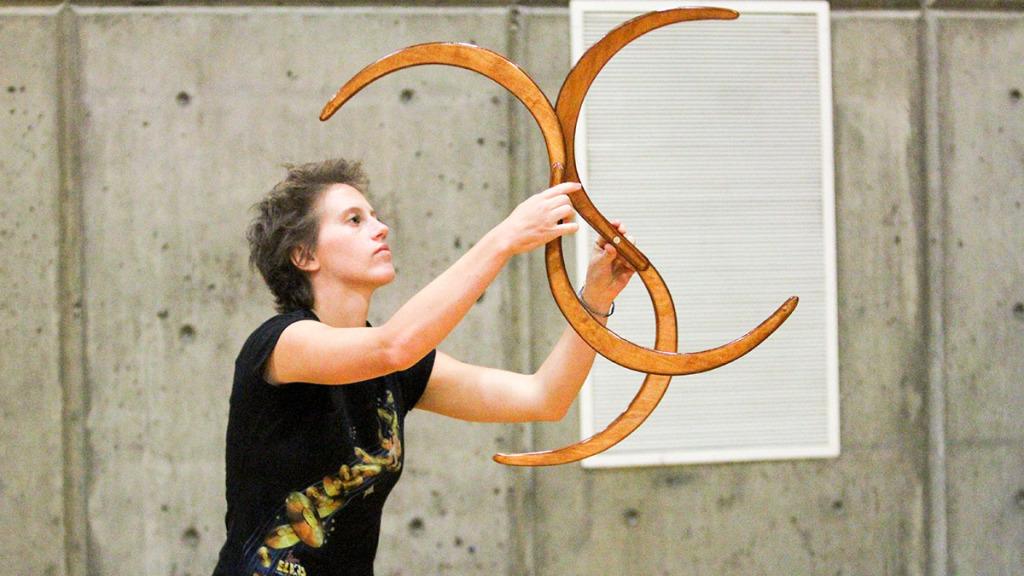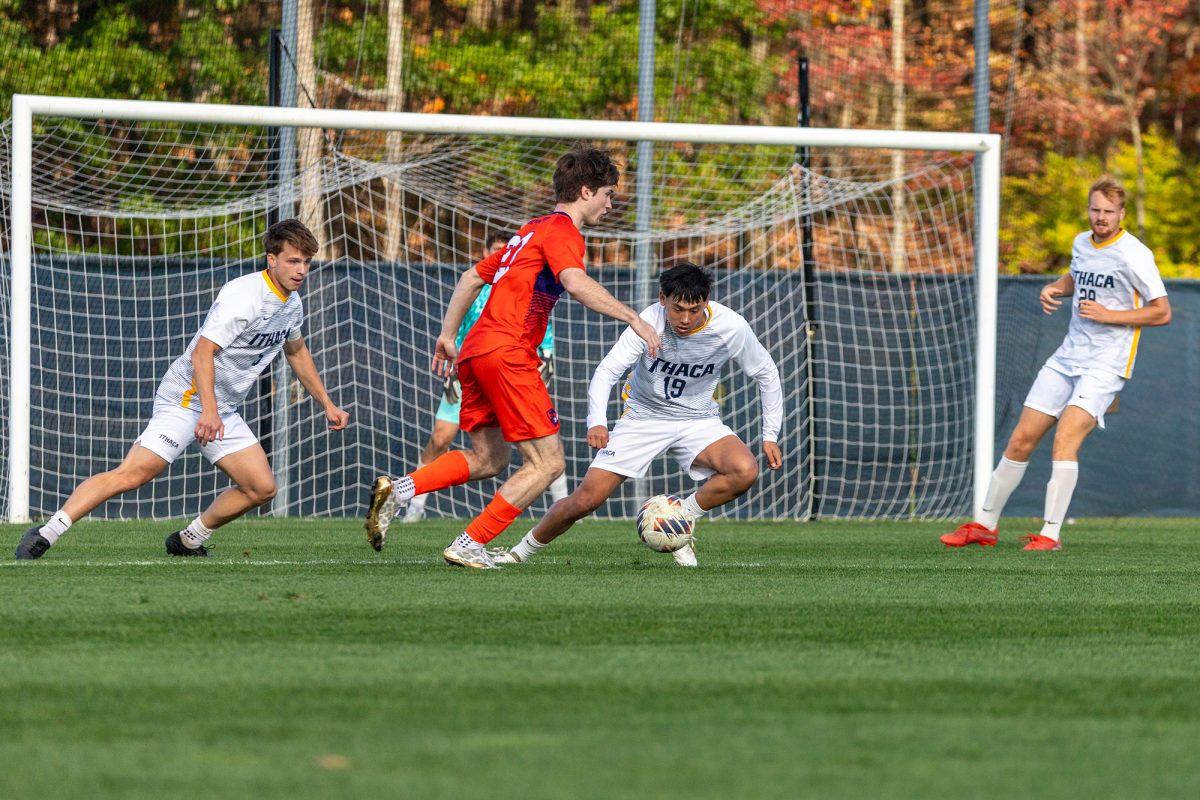A colorful array of hula hoops are scattered across the court of Mondo Gymnasium in the Fitness Center. A few steps over from the hoops sits a big, gray tub filled with a number of different items, including small juggling balls and much more intricate props like clubs and rings for more complex juggling tricks. The rather lively group is spread out across the gym, with members free to practice a wide variety of skills at their own paces. Juggling balls and clubs fly in the air. Hula hoops circle around bodies through difficult and elaborate motions. Blue and white mats lay on the wooden floor for someone to tumble and to practice their acrobatics.
At 8 p.m. on Tuesday and Thursday nights in the Fitness Center, the Ithaca College Circus Club takes over the gym. The sound of basketballs bouncing, feet shuffling and shoes squeaking on the court is replaced by the sound of laughter and jubilant encouragement, while soft music can sometimes be heard playing in the background. The wood floor gym no longer exists as just a competitive basketball court, but rather, it becomes a circus, an environment that the enthusiastic bunch has come to love, sophomore Aaron Roberts said.
“We’re out there just being weird in front of a whole bunch of people, so you really get comfortable with everybody who’s around you,” Roberts said. “We’re a big family.”
ICircus was founded in 2004, and sophomore co-president Devon Baris said it has been fostering creativity and developing the talents of each of the members to a greater degree of complexity ever since. The group, which is currently comprises of 15 people, practices both mentally and physically demanding skills including juggling, balancing, acrobatics, poi spinning, hula-hooping and tumbling.
Practices typically begin with a group activity or a game to get everyone’s energy up. These games can range from something like handball to even an activity called “commissioner,” where a member of the group sits in a chair while trying to maintain his or her composure while others try to make him or her laugh, Baris said. Then the group will focus on working on specific skill sets such as handstands, group acrobatics or juggling. From there, performers may break off into their different specialties and practice what they please.
Sophomore co-president Kevin Flanagan said students of all levels of talent are welcome, and it is a place where people are encouraged to be comfortable and to break out of their shells.
“Our kind of mentality going in is inclusive, and everybody kind of picks up on that as an unspoken rule,” he said. “We really try to encourage people to push themselves, and that’s kind of one of the main points of the club: to get out of your comfort zone and do something you wouldn’t normally do.”
Being comfortable is a very important aspect of the club and is essential when it comes to acrobatics, Flanagan said. When the group works on acrobatics, comfort level is critical as there is constant physical interaction, so it is very important that people are acclimated to one another.
Baris said the friendly environment allows practices to be very laid back and unstructured unless they have to prepare for a performance. During each semester, the group will do about seven performances, both on campus and off campus. Organizations on campus, including IC Big Brothers Big Sisters, will often have ICircus perform at events. Last year, the club also performed at Relay For Life and this year, the club has performed at Apple Fest. Currently, the group is working on putting on a show for a world hunger charity branch in Ithaca, Feed My Starving Children.
While practice is still very free leading up to performances, Baris said students must work on their performances and then present them to the whole group, which always makes sure to give constructive feedback.
“I think something that’s very gratifying is there’s no such thing as saying, ‘You suck,’ or ‘That’s really bad,’ but it’s never babied either,” Baris said. “It’s a very nice fine line, and it’s always encouraging, which I think that’s very important.”
For freshman Harrison Kesel, it was this sense of comfort and openness that drew him to the club. Kesel, who had prior juggling experience before joining ICircus, was walking near the Academic Quad when he saw a group of circus club participants juggling. It just so happened that he had his own juggling balls with him and asked if he could join.
“This was like the second day I was on campus, so it was pretty exciting for me,” Kesel said. “We just started juggling and they taught me a couple things in the first couple minutes I was there. So then I came to their first practice and it went from there. It’s a lot easier than learning from YouTube.”
While Kesel was unaware of the club until this encounter, it was the opposite case for Roberts, who came to the college partially based on the fact that it had a circus club.
It was the fall of his senior year of high school when Roberts first stepped on to the college’s campus for a tour. As the tour guide was mentioning some of the different clubs on campus, it was the circus club that caught his attention. Roberts said that the very presence of such a club at the college played a large role in his favoritism for it, as it was the only school to offer such a distinguishable opportunity.
“The circus was one of the first performances that I saw when I was really little,” Roberts said. “I’ve always been really interested in circus performance and the atmosphere and culture of it. I was very, very interested, and I had never actually participated in it in my life before coming here.”
While Roberts was intrigued by the circus club, Baris said there is definitely a judgment about what it means to be in circus club, as most students who hear about the club do not think very highly of it.
“When people see us doing what we are doing, there are positive reactions, but when people just hear about it, a lot of unnecessary judgment goes into it,” Baris said. “Honestly, we call ourselves a circus when we are more just like a varied skill act.”
Baris added that people who do not necessarily know what circus entails do not consider how both mentally and physically demanding circus can be. Acts such as juggling and poi spinning can be very mentally challenging, as they can take a considerable amount of focus, understanding and attention to figure out how to execute the acts, he said. Baris said balance, hand-eye coordination and strength all come together to create a diverse circus performer, while mental capability is also very important.
“When you’re working on a pattern with whatever the prop, you need to be able to mentally understand what is going on with the prop or your body, which is a prop,” he said.
Not only are circus acts mentally demanding, but they also require a large degree of athletic ability, Flanagan said. Many of the athletes risk their lives performing feats such as human pyramids and flips where they potentially risk tumbling off, hitting their heads or breaking their necks. But, Flanagan said because of the level of comfort and trust they have, the individuals are able to challenge themselves.
“On the grander scale, circus as a whole is not considered by the mainstream media a sport or a form of athletic outlet,” Flanagan said. “And then there’s the circus community, which is producing probably some of the best athletes that this country and the world will ever see.”
Cirque du Soleil, a Quebec-based artistic entertainment company, even recruits former elite Olympic gymnasts and divers for many of its shows because of the athletes’ level of skill and adeptness that translates well to the sport-art hybrid. Flanagan said he believes circus performers are just as talented, physically, as any other athlete.
“So like an acrobat, a term that I’ve heard used a lot is physical literacy,” he said. “An acrobat is strong, flexible and aware of their body as opposed to let’s say a football player, who knows how to run and catch a ball. There’s still that stigma and stereotype behind circus, which doesn’t permit for some sort of in between for [being both a sport and performance].”
Regardless of what people think of circus performers, Flanagan said he could not imagine what he did until he joined the circus club.
“I don’t know what I did up until this point,” Flanagan said. “It’s crazy. It’s good. It definitely takes up a good portion of time — but time well spent.”














